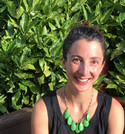Julia MacKenzie, PhD, MPH

Graduation Year: 2010
Advisor: Longnecker, Richard
Current Position: Chief Programs Officer, American Association for the Advancement of Science
Julia MacKenzie grew up in Iowa City, IA, and attended St. Olaf College in Northfield, Minnesota. She joined the dual PhD/MPH program in DGP in 2005 and later joined the lab of Rich Longnecker in the Department of Microbiology-Immunology. After graduation, Julia’s career has taken her into the world of science policy and non-profit work. She is currently the Chief Programs Officer at the American Association for the Advancement of Science (AAAS).
What made you want to go to graduate school?
St. Olaf had a fabulous biology program and I really loved immunology in particular. But when I graduated, I still didn't have experience doing bench research outside of short class-based labs. My immunology professor let me know about the NIH's post-baccalaureate program which supports recent undergraduates to do 1-2 years of research within NIH's intramural program. So I did that program for two years in a lab that studied HIV and immunoregulation. That experience inspired me to pursue grad school.
What brought you to Northwestern and the IGP/DGP?
I applied to nearly 10 grad programs because I was trying to coordinate grad school with my now-husband who was applying to law schools. The IGP/DGP stood out because Steve Anderson struck me as a trustworthy leader, downtown Chicago was a baller place to go to school, and it offered a PhD/MPH dual degree opportunity that wasn't offered anywhere else.
What did you study in graduate school?
First, I studied blood stage Plasmodium falciparum infection (malaria parasite). But that PI, Dr. Kasturi Haldar, moved to Notre Dame, and I decided not to follow. So I pivoted to studying Herpes simplex viral entry with Dr. Richard Longnecker, and I was able to convert a small portion of the Plasmodium research I had already completed into my MPH thesis.
Did you do a postdoc? What did you study?
Not really. Dr. Longnecker let me finish some research in his lab post-graduation, so I did a very brief postdoc but within my thesis lab.
What was your first job outside of academic research, and how did you get it?
I did the AAAS S&T Policy Fellowship which allowed me to take the leap from bench research to policy work. My fellowship was within the U.S. State Department, which is the federal government agency focused on diplomacy and foreign policy. The most consequential global health program was (and is) headquartered there, which is the President's Emergency Plan for AIDS Relief (PEPFAR). I started as a fellow focused on clinical laboratory services. After my fellowship ended, I was hired by State, still working on PEPFAR, becoming a senior technical advisor on a range of issues primarily focused on population-level implementation science studies based in five sub-Saharan African countries.
What is your current position? Please describe the big picture of your position as well as a bit about the day-to-day.
I'm the Chief Programs Officer at the American Association for the Advancement of Science (AAAS). AAAS is a multidisciplinary scientific society and nonprofit that publishes the Science family of journals and runs programs that help improve the scientific enterprise--for instance, by making it more inclusive--and help connect science and scientists with journalists, policymakers, judges, and faith leaders. I'm focused on those programs, leading a team of about 80 people and about $35M of annual funding through grants and philanthropy that allow us to, as our tagline says, "advance science and serve society." Day in day out, this means strategic planning and building new partnerships, writing and editing grants, managing people, recruiting people, managing finances--meetings, emails, some public talks, more emails...
How did Northwestern prepare you for your current career?
The perseverance required to complete graduate school was incredibly formative. It's also a process that required me to develop skills like advocating for myself, knowing how to build and nurture collaboration, acknowledging uncertainty while plowing forward with decisions and being honest about the results. My time at NU really crystallized for me that the only way to get anywhere meaningful is together with others--a mix of peers, mentors, even competitors--while simultaneously learning what it takes to ultimately be accountable and responsible for your work.
What advice would you give to current students interested in pursuing a career similar to yours?
I'm a big fan of fellowships or similar opportunities (internships and the like) which usually allow you to enter a situation where you'll confront a very steep learning curve, but you'll do so from the supportive frame of a cohort of other fellows and other supports that truly make it a more intentional professional development experience.
Do you have any final advice for graduate students?
Keep going! The intellectual humility, deep curiosity and perseverance required from grad school will serve you well!